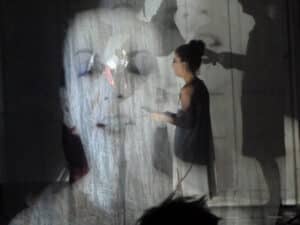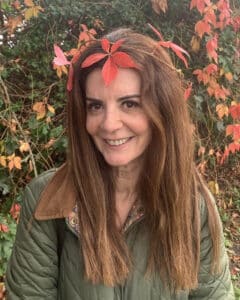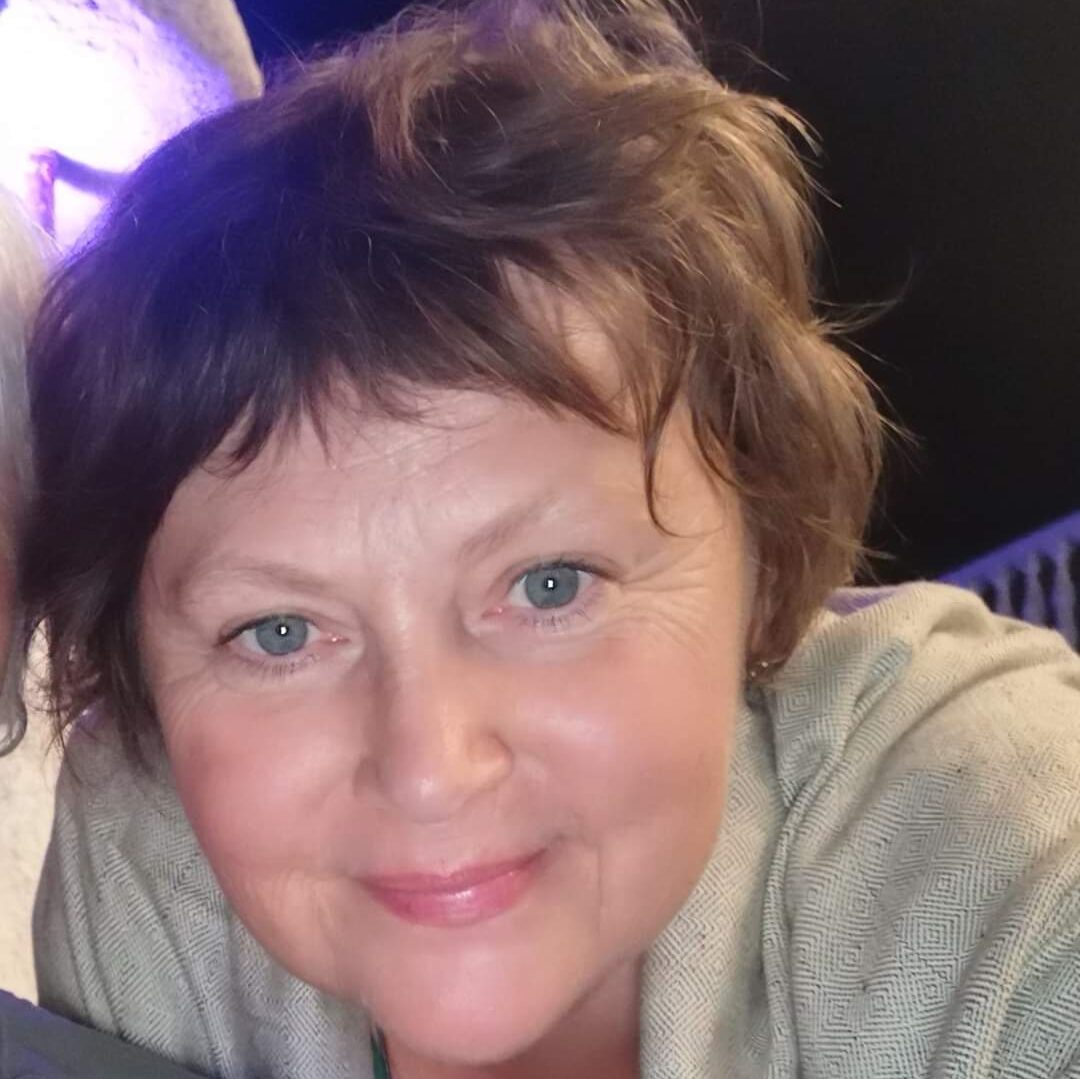AGNIESZKA RAKOCZY meets an acadmic who says education is her weakness now entering her ‘third act’
Ten years ago, London-based Turkish Cypriot poet and journalist Mustafa Izzet Adiloglu first showed his daughter, Alev Adil, the treasured notebook he kept by his side. In her essay A History of Forgetting and Ignorance, Adil, herself a poet, artist, performer and academic, recounts how her father told her, “You are poet too and it will be yours when I die.”
The slim, handmade volume, its pages fashioned from a 1917 illustrated English journal, had been bequeathed to Adiloglu by his mother Fatma Hanum, the wife of Izzet Bey, a member of a wealthy, landowning family.
It was originally created by Fatma’s father Mustafa Nuri Effendi, the Cairo-educated Imam of Famagusta’s medieval Saint Nicolas Cathedral turned mosque. All the notebook entries were written in Ottoman Turkish script, filling the blank spaces between the display of First World War images. They cover the tragic period of Mustafa Nuri’s life when he was held prisoner by the British in Kyrenia castle. Since Ataturk changed the Turkish alphabet from Arabic to Latin lettering in 1928, today it is only a specialist who can read the scripted notes.
In her essay, Adil explains how during the war the Imam, who also wrote poetry, had been permitted by the British to visit the Ottoman PoWs detained in Famagusta “to offer religious instruction and spiritual comfort” only to be subsequently accused of trying to help them by smuggling in food and allegedly aiding their plans to escape. In 1916, he and 14 other prominent Turkish Cypriots were arrested and interned for two years without trial in Kyrenia castle. While there, he and a co-prisoner Mahmut, a son of the well known Famagusta Judge Naim Bey, agreed that the Imam’s daughter Fatma would marry Mahmut’s younger brother Izzet who lost his eyesight at the age of 12 as the result of an accident.

At the Royal Maritime museum
The two prisoners were released when the war ended. Sadly, the Imam died shortly afterwards, heart broken that his wife and their youngest child had died during his imprisonment, his health broken by the harsh conditions in the old castle.
“He died of the Istanbul sickness,” Adil tells me in her north Nicosia flat where she stays when she visits from London. „Interestingly, my English great-grandmother died of the same sickness in Oxford in the same year. They called it the Spanish influenza there.”
Nicosia-born and UK-educated, Adil often includes Cyprus imagery, experiences and memories in her works. The story of Mustafa Nuri Effendi and his descendants not only features in her writings but also became the basis for her art installation performance entitled The Four Dreamers shown earlier this year at the Till We Meet Again exhibition in Nicosia’s Centre for Visual Arts and Research.
It is interesting that while Adil’s essay focuses more on the story of the men in her family, the visual piece concentrates much more on the women.
“I started with writing and making images and during this process I was thinking mainly about my great grandfather, grandfather and father,” she says. “But when I started making the installation I became aware that the women were missing from my story. I don’t know anything about my great grandmother Ayse who died when her husband was in prison, and realised that my grandmother Fatma, who lost both her parents at such an early age, should be more present. That’s why my installation and performance have this much dreamier environment, with pillows, coffee cups, household phrases and routines.”
This period of Cypriot history is fascinating, the moment of change as the island’s Ottoman past fades away after the British taker-over just as Turkish Cypriots start to follow the modernization reforms introduced in Turkey by Ataturk. That so little is known about it currently is a pity since so many interesting stories are to be found there.
Adil agrees.
“The Ottoman culture disappeared in Cyprus very fast,” she says. “Kemalism was quickly adopted by Turkish Cypriots because once the British took over the island they felt disempowered and lost a lot of their wealth. Ataturk’s reforms gave them a chance to put all this behind them and to modernise. As a result, we have this suppressed heritage, something we rarely talk about. I think of it as a hangover of Kemalism…
“Take my grandmother, for example. She grew up as this Ottoman girl, an imam’s daughter who married an atheist man from a feudal aristocracy. Their generation had grown up Ottoman and became Kemalist. She was secretly religious. As a child I heard many stories from her, only to realise years later that most of them were based on the Koran. And when I had my own son, she told me that my father was a hafez at the age of three, reciting huge fragments of the Koran from his memory. But then his father found out about it and forbade it. And you know what? My father is a devout atheist, he would never recite Koran again, but he recites poetry beautifully.”
Considering the heritage that this attractive, independent, vibrant woman represents – such a huge transition within just few generations – it strikes me that everything Adil does is deeply connected to her past, and not just this Ottoman past but also the Cyprus problem.
Born in the old town of Nicosia, she is of mixed heritage, her mother being British artist Maureen Adiloglu. “My parents met by chance getting off a London bus. There was an immediate electricity and up to this day they are deeply in love”, she says. Little Alev soon found herself in Anamur, a small village in Turkey, where her father went to work as a journalist for the Voice of Cyprus, when the Turkish Cypriot radio broadcasting station was set up there in response to rising tensions on the island.
“The village was near Mersin, it didn’t have any electricity so it was a big shock for my mother.” She remembers how a little girl would “bring fresh milk to our house every morning”. Although only about three or four years old, she was totally independent, “allowed to go anywhere in the village on my own.”
Several years passed before the situation in the island became more peaceful and the enclaves opened, at which point the family returned to Cyprus. Ironically, it proved to be a move that marked the end of Alev’s freedom – “suddenly I became an apartment child and all my cousins mocked me for my Turkish accent”.

Then came 1974. Alev and her parents were still in Nicosia, and her memory is of moving around a lot. First, they left their own flat to stay in an aunt’s house, before moving somewhere close to the Ayia Sophia Cathedral in the old town.
“I never figured out where we were, but there was a building with giant underground rooms with meat safes and this is where we mostly stayed. And even though my parents always tell me I can’t remember the war because I was too small, I wasn’t that small and I remember that time very clearly. I remember hearing things in the old town and lots of bombing and shooting, and the sky that was so full of dust it looked apocalyptic. I remember we used to try to recognise the planes flying over us by sounds, whether they were Greek or Turkish.”
The war, she says, brought so much trauma to her to this day she hates fireworks. Once, several years ago, when she came to the island for a meeting at the university in Kyrenia, on hearing the sound of planes flying very low over the building, she instinctively dived under the table. “It was very embarrassing”, she admits sheepishly.
She pauses a moment before adding: “I think there is a lot of hidden post-conflict trauma in Cyprus, both among the people who lived through it and an inherited version. It is in the open but nobody speaks about it. It is something that always stayed with me and this is why I always wanted to come back here.”
Her mother, clearly traumatised herself, insisted on leaving the island as soon as the war was over. The family moved to London and very soon afterwards Alev’s father got a job in a Turkish company in Libya. While his wife followed him to Benghazi, Alev was sent to an all-girl boarding school she chose for herself.
“It was September and England was so grey. For me, leaving Cyprus was like moving from a colour film to a black and white one. My mother was sick, my father was not there and I was told to handle the applications to the school on my own.” Alev was happy in the new school but just after two years her parents came back to London, bought a little house and decided to uproot their daughter once again, sending her to the renowned prestigious Godolphine and Latymer School for Girls in Hammersmith.
That was the last time they made a decision for their strong-minded daughter.
“The school was very competitive academically and socially, and I didn’t like it. I was constantly in search of intellectual enlightenment and freedom. At 17 I became a performance poet. It was the 1980s and I performed in various music places. I would be paid and get free drinks. I quickly became well known and featured on Radio 4 and on TV. The day I turned 18, I left home.”
Alev was writing in English while her father’s poetry was in Turkish. Her career took off and even though she got a scholarship to read literature at Oxford she opted instead to take a gap year. And then she decided to study philosophy at the London School of Economics instead Why? She thinks there were several reasons.
“Because I was a performance poet in London and I was madly in love with my boyfriend who was in London. And I felt Oxford was not really the place for me. And I imagined that the LSE would be full of socialists,” she confesses.
“It was such fun to live on my own. I worked as an evening maid at the Savoy Hotel which was great because my shift would start at 5pm and finish at 10pm. So I could sleep in because I am not a morning person and after 10pm I would go clubbing and performing…
“There I was performing and working and at the same time going to university and as soon as I graduated I got married and had a son… very fast… This was partly because of the relationship I had had from age 16 to 19, which when we split up left me feeling bereft… So, when three years later I met my husband, everything happened very fast.
“I am an education junkie so as soon as my son was born I panicked and did an MA in Film Studies. Then, when the marriage went wrong I did the second one – in Cultural Studies. Luckily, they were not expensive at that time, so I could pay for them myself.”
While doing her second MA, Alev met well-known cultural theorist and feminist Angela McRobbie, who became a mentor. “She was very supportive and helped me to get some part-time academic work. That is how my academic career started”.
Pointed in the right direction, Alev realised she had to have a more stable income if she was to provide for herself and her son. She focused on teaching and academic research, did a PhD at Central Saint Martin’s, and published widely in international academic journals as well as in cultural magazines.
So what now?
“Education is my weakness so I have just started another course, this time at Cambridge, in coaching. And I have taken a break from full time academia to care for my parents who are getting older. I am also preparing a collection of my poems in Greek to be published in Greece, and I am looking for a translator to do the same in Turkish. On top of that, I am writing a novel and, because there seems to be some interest in the subject since I published the essay about my great grandfather, grandfather and father, I am considering a memoir. And I am developing various art pieces. It seems like I am in a phase where I am looking to actually get my work out there.
“To sum up, if you think of life as a play, we all know that the third act is the most important since it serves to make sense of everything, giving everything shape and meaning. Perhaps this is the juncture my life has arrived at.”
Laughingly, she cites the film Sunset Boulvard, declaring that like Gloria Swanson, she too is ready for her close up.







Click here to change your cookie preferences